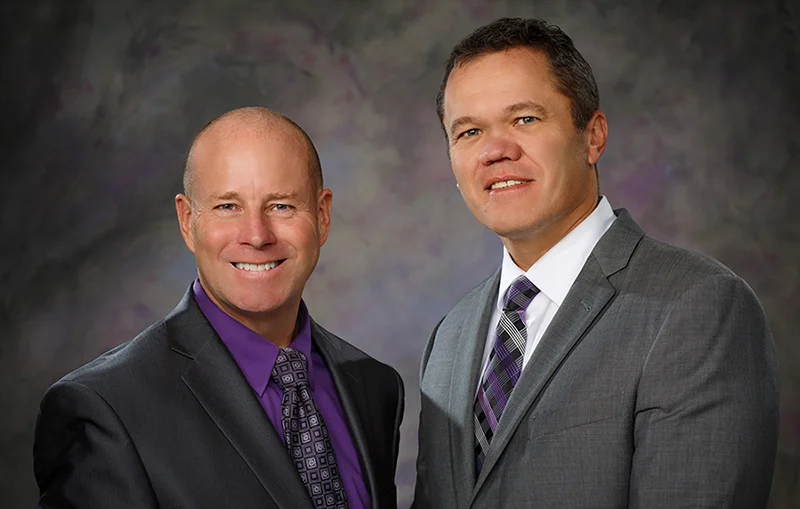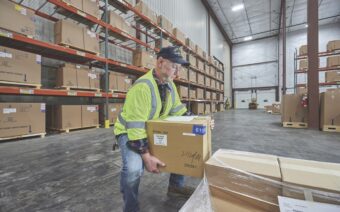
January 12, 2023
APPLETON – Temporary employment agencies have oftentimes been a part of the job conversation.
With where the job market is today – with more vacancies than employees to fill them – these agencies continue to hold their own in the industry.
One of those agencies – Flex-Staff – has called Appleton home for the past five decades.
Now in its second generation of leadership, the temporary employment agency has grown both in size and offerings.
CEO Steve Kamrowski said the company actually got its start as a permanent-placement firm franchise called Dunhill by his mother and stepfather in 1973.
“They had a permanent-placement franchise in Rockford, Illinois, purchased the second one in Appleton and added temporary placement,” Kamrowski said. “They then sold off the Illinois one and focused on Appleton. They eventually bought their way out of the Dunhill, and in 1986, changed the name to Flex-Staff.”
As the company starts its 50th year in business, Kamrowski said though many things have changed and evolved with the wants and needs of both employees and employers, Flex-Staff’s focus on providing the highest possible level of service has never wavered.
Clerical, light industrial positions
Kamrowski said Flex-Staff goes beyond simply placing employees in open positions.
“We’re staffing specialists who work to carefully match the skills, experience and career goals of our assigned employees to the specific requirements of the positions at our client companies,” he said.
Kamrowski said Flex-Staff specializes in the categories of clerical and light industrial.
“We offer temporary help, which would be a person for a day, a week, a month, but that person would remain on our payroll,” he said. “We also offer what we call temp-to-hire (staff). A company calls us and says, ‘hey, we need to add people to our permanent roster, but we want to bring them in through Flex-Staff.’”
Kamrowski said Flex-Staff also offers payroll service plus.
“Which is basically an employer-of-record service where we become the employer for candidates that a client company wants to have working at their company, but don’t want as employees of their company,” he said.
Kamrowski said while that may sound a bit odd, there are a variety of reasons a company would do that.
“One is if they’re just staffing for a short-term position,” he said. “They’d have to add them to their timekeeping system, issue ID cards and enroll them in their benefits programs. That’s all fine if it’s going to be a long-term employee, but for a student you’re bringing in for a couple of months for summer, it doesn’t make sense.”
Another reason a company would use Flex-Staff’s payroll service plus, Kamrowski said, is to bring back a retired employee.
“You have a retired engineer, supervisor or manager you need to bring back to do some consulting work, but you can’t bring them back as an employee of your company because that would affect the retirement benefits,” he said. “But they can bring them back as an employee of Flex-Staff and have them working at their company as a consultant, and it doesn’t impact any of that.”
Kamrowski said the last service Flex-Staff offers is direct placement.
//s3.amazonaws.com/appforest_uf/f1673551720652x437110294820952450/richtext_content.webpCarol Hackbarth, Steve Kamrowski’s mother, is pictured here at the groundbreaking of Flex-Staff’s Appleton headquarters on May 20, 1986. Flex-Staff was the first building on Westhill Boulevard in Appleton. Submitted Photo
“That’s when a company wants to hire someone, but they don’t want that person to work as a temporary employee through Flex-Staff,” he said. “They want that person to come immediately onto their payroll. So, we would place that person directly, for a one-time fee.”
Kamrowski said one of the things that set Flex-Staff apart is its screening and hiring processes.
“We’re a bit more stringent,” he said. “We try to place people in jobs they’re going to be a fit for, jobs they’re going to like and jobs they’re looking for in terms of their skills, experience, background and career interests.”
Kamrowski said Flex-Staff doesn’t place employees into positions just because it needs to be filled.
“We’re not going to try to force them into a position just because that’s an opening we need to fill,” he said. “We find if you try to force people into something that’s not a fit for them, they’re not going to last. And the only thing worse than not filling a position is filling it with the wrong person and having employees turnover one after another.”
Biggest change
Kamrowski said though visible as of late, the lack of employees for the number of vacancies has been slowly becoming an issue for the last two to four years.
“It’s been coming for a while, but that’s the biggest change we’ve seen (over the past 50 years),” he said. “It takes so much more work to fill each position than it ever did – so much more expensive in terms of our time with recruiting expenses. You have to continue to do more and more to achieve the same result.”
Kamrowski said the market has been waiting for the next recession to make things a little better, but “the economy keeps chugging along.”
“Which is not a bad thing, but it means there are a lot more jobs than people and so many companies are impacted by it,” he said.
Kamrowski said with being a part of the employment market for the past 50 years, they work with many of the same companies they’ve worked with for years.
“However, whenever the labor market gets tight like this, we do see more companies calling,” he said. “So, yeah, we’re seeing an increase in companies calling us we haven’t heard from before.”
Even with the increased interest and workload, Kamrowski said Flex-Staff still holds true to its stringent screening and hiring processes.
“We’re still picking,” he said. “We’re not just going to hire anyone. We’re not just going to place anyone. We still try to hire the best candidate, and we still try to place people with regard to fit, as well as skills.”
In terms of job posting changes, Kamrowski said things have remained relatively unchanged besides the platforms.
“There’s a lot of social media and various online job boards – it’s a different game as far as that goes,” he said.
A closer look at a position’s pay, Kamrowski said, has also become more important as of late.
“When people are considering positions, they have a lot more options than they ever have,” he said. “So, they can be picky about pay.”
Kamrowski said a job that paid $10-$12 as recently as four or five years ago, “you can’t find someone to do it for under $15, $16 or $17 now.”
Including the pay rate with a job posting, Kamrowski said, is helpful in getting prospective employees to read further.
“One of the key things that will catch people’s eye is the pay rate,” he said. “If you put the pay rate out there, that’s going to stop them. If it’s good enough, they’ll read the rest of your job posting.”
The future
Kamrowski said he and his stepbrother took the reins from their parents in 2006 when they retired, becoming the company’s second generation of leadership.
Though they both have children of their own, at this point, Kamrowski said it doesn’t look like a third generation will take over when they retire.
“I have three children, Mike has two children, but our intention is not to push them toward the business,” he said. “We wanted them to take their own paths. None of them have leaned toward wanting to take over the business.”
Kamrowski said for now, he and Mike will run the business.
“We’ve been approached with offers to buy, and I don’t think that’s necessarily the direction we’re leaning,” he said. “If we had a family member to pass it to we’d love to do that. But in the absence of that, I would rather have a management team that would continue to run it and we would keep the business versus passing it onto someone through a sale. Who knows what the future holds.”
At the end of the day, Kamrowski said Flex-Staff will continue its mission of helping people.
“This type of work is about helping people, and it’s about making a difference,” he said. “Maybe we gave someone a chance when no one else would. And they wound up getting into a job and eventually got hired on. They’ll tell us how grateful they are for the opportunity we gave them. That’s very motivating.”
 Jeopardy! champ pays it forward
Jeopardy! champ pays it forward 4imprint completes 170,000-square-foot expansion
4imprint completes 170,000-square-foot expansion








